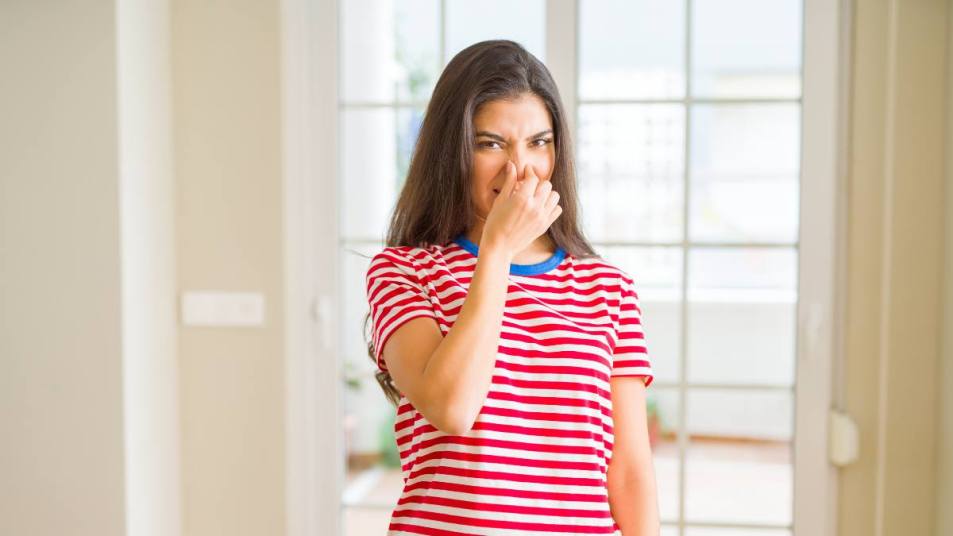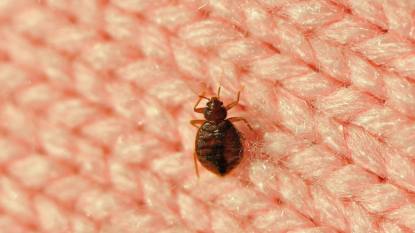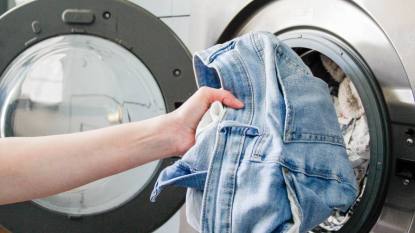8 Reasons Your House Might Smell + The Easy Ways to Find the Source and Fix It Fast
Plus, the two smells that could spell danger

You’ve cleaned your home, washed your clothes, taken the dog in for a grooming, but your house still smells – well – stinky! “There are really dozens of reasons a house can smell,” says chemist and social media content creator Alexis Rochester of ChemistryCachet.com. “Anything from trash cans to pets can cause bad odors in your home, and smells can also linger in things like carpets, fabrics and even paint on your walls. This is what makes them so tough to tackle!” So if you’re wondering why does my house smell, read on as experts reveal the answers, explain the most common places for odors to linger and give advice on how to banish the smells once you’ve found the source of the stink!
Why does my house smell?
It could be mold or mildew
While slightly different in terms of where they grow and how they look, both mold and mildew are fungi, which spread into the air through spores, and both can produce a musty smell. While mold is usually dark green or black and can grow on walls, in the door of your washing machine or dishwasher or on your shower curtain, mildew is more whiteish or grayish in color and typically grows around damp and shady window frames or on shower tiles or bathroom towels. “Solving a mold or mildew issue starts with cleaning,” says realtor and social media content creator John Colemam.
Start by identifying the source of the smell, and then use a bleach solution of one cup bleach to one gallon of water to clean the offending spots. You’ll most typically find the source of the smell in your bathroom, laundry room, basement or kitchen. The flange in a front-loading washer is a typical culprit because water tends to sit there, says Coleman. “People don’t think about cleaning the things that do the cleaning, but those are the most important.” Once you’ve eliminated the odors, focus on ventilation to prevent them from reoccurring in the future.
It could be laundry or bedding
Our clothing and bedding absorb oils and skin particles from our bodies as we wear clothing and sleep in our beds — and those oils and particles can be the source of unidentified musty or sour odors. The good news is the odor of soiled clothes or bedding is relatively easy to remove. Simply wash the offending items — along with the hamper if it’s cloth! If the odor lingers, two common methods for odor removal of any sort are trapping the molecules or neutralizing the molecules, says Rochester. This means using volcanic zeolite rocks that capture bad odors and can then be “recharged” in sunlight or using air fresheners like Febreze that use a chemical like Cyclodextrin to trap odors. “Cyclodextrin has many uses, but trapping the molecule is what makes it effective in air care products,” says Rochester. Essentially, the odors bind to the Cyclodextrin molecules, and as the product dries, the concentration of scent molecules in the air is reduced.
See zeolite rocks in action in this YouTube video from The Switz :
Related: How To Make Laundry Smell Good: Experts Share 7 Secrets to a Freshly Scented Wash
It could be the carpets/upholstery/window treatments
“If you have carpeting or rugs in your home, they can hold onto a lot of smelly scents,” says designer and social media content creator Kristen McGowan. That’s because soft surfaces like carpets, your furniture and even the curtains on your windows can absorb odors, which then linger on these surfaces. Give them a sniff to see if they stink, and then start cleaning. Laundering curtains and steam cleaning your carpets and upholstered furniture will help to tackle any unwanted scents there. Don’t have time for a steam cleaning? “You can refresh them by mixing baking soda and essential oils to create a mixture you can sprinkle onto your rugs,” says McGowan.
“Evenly sprinkle the mixture onto your rugs and carpets and let it sit for a minimum of 15 minutes, then vacuum the rugs as you normally would! This will leave a lasting fresh scent in your home that makes it smell like you hired a professional cleaning crew.”
You can also use vodka to banish bad smells! Mix 6 oz. of filtered or distilled water with 1 oz. of vodka in a spray bottle and mist furniture, curtains or carpets with the mixture. The liquid molecules of vodka trap the scent particles, and as the alcohol evaporates the scent disappears.
See Amy Bates of Don’t Look Under the Rug use this spray on an article of clothing here:
It could be pet-related
We love our pets, but the dirt, oils and potential accidents they have can all make our homes smell like, well, a wet dirty dog – and litter boxes can add their own unpleasant aroma to the air. “Smells that come from pets need to be completely cleaned and removed,” says McGowan. This means cleaning carpets and upholstery with the methods mentioned above, scrubbing down any walls that may hold lingering odors from pets rubbing against them, and then using a deodorizer that captures and dispels the scents rather than just masking them.
Related: Dog Poop on the Carpet? These Easy Pro Tricks Will Get It Deep-Down Clean Fast
See McGowan’s video here for how to make your house smell great:
It could be the garbage
When food particles begin to break down, microbes form in order to feed that decomposition. These microorganisms “eat” trash and release chemicals that smell at the same time. Typical sources of a garbage smell in your home are trash cans, the garbage disposal and even your refrigerator if food is left there for too long.
Like anything else in your home, trash cans should be scrubbed down on a regular basis to prevent foul odors from forming. The same holds true for your refrigerator, which should be purged and disinfected on a regular basis. A basic solution of 8 oz. of white vinegar and 8 oz. of distilled water works great as both cleaner and disinfectant. For your garbage disposal, Coleman recommends ice cubes and frozen lemon pieces. “It sharpens the blade and also cleans up the smell,” he says.
Related: The Best Way To Clean Your Garbage Disposal To Get Rid of Grease, Smell & Clogs
See this method in action here with the addition of vinegar as well:
Related: 13 Brilliant Uses For White Vinegar Guaranteed To Make Your Life Easier
It could be new furniture
Because of stain protectors and flame retardants, upholstery releases volatile organic compounds (VOCs) when it’s new. Unfortunately, there isn’t much you can do about the smell of these VOCs. The good news is that smells wear away with time, and airing them out will help them dissipate more quickly. Simply opening your windows and allowing fresh air to circulate in your home should help reduce and eventually eliminate these odors.
It could be smoke
Whether it’s from smoking or a food fire, smoke particles can cling to everything from upholstery to walls in your home, and the only way to get rid of the smell is to wash it away and then cover it over. This means deep-cleaning upholstery, carpets, floors and walls, as well as having your HVAC system cleaned. Then think about using an ozone machine to really get rid of the smell. “An ozone machine is also super helpful because it actually eats the air, getting rid of any smells,” he says, but notes that homeowners cannot be in the home if they decide to use one of these — and neither can plants or pets.
Related: Home Pro’s Genius Fan Trick Helps Get the Smell of Burnt Food Out of Your House
See Coleman’s YouTube video on how to get rid of that smoke smell here:
It could be dirty air vents and ducts
The dust particles, hair, pet dander and other things that can line the vents and ducts of your home’s ventilation system can be the source of a musty or stale odor in your home, says Coleman. “There are big clumps of lint and dust and all of that stuff sitting there absorbs the smell, so unless you do a duct cleaning, you’re still pushing air past those saturated materials.” Coleman recommends having a professional duct-cleaning service come as well as changing any vent or air conditioning filters.
What smells could be sign of something serious
Some smells are more than just unpleasant and can actually be signs of trouble brewing somewhere in your home. Here are two to be aware of:
1. Rotten eggs
A faint smell of rotten eggs or sulfur in your home could potentially be a sign of a gas or sewer leak, say the folks at Storm Guard Roofing & Construction. Natural gas is odorless, so a chemical that smells like rotten eggs is added, so we know when it’s leaking.
While the solution to a minor sewer gas leak from an unused bathroom can be as simple as pouring a cup of water down the drain to prevent the smell from escaping from a dry drain trap, a potential gas leak can be deadly. Be sure to have a professional check out this smell as soon as you notice it.
See this video that discusses several types of bad smells, including a gas leak:
2. Fishy or urine smells
The chemicals and plastics used in electrical outlets, breakers and insulation can emit a urine- or fish-like smell when there’s a potential electrical issue, say the folks at GAC Services, a cooling, heating, electric and plumbing company — and the smell can come and go. If you notice an odd smell like this, call in a pro to get it checked out.
Related: Simmer Pots Make Your Home Smell Amazing + Boost Focus and Ease Stress: How to Make Them
For answers to more home-related questions, click through the links below!
What Temperature Should a Refrigerator Be? Pros Reveal the Ideal Number That Saves You Money
What is The Best Time to Water Grass? + The Simple Signs It Needs More













